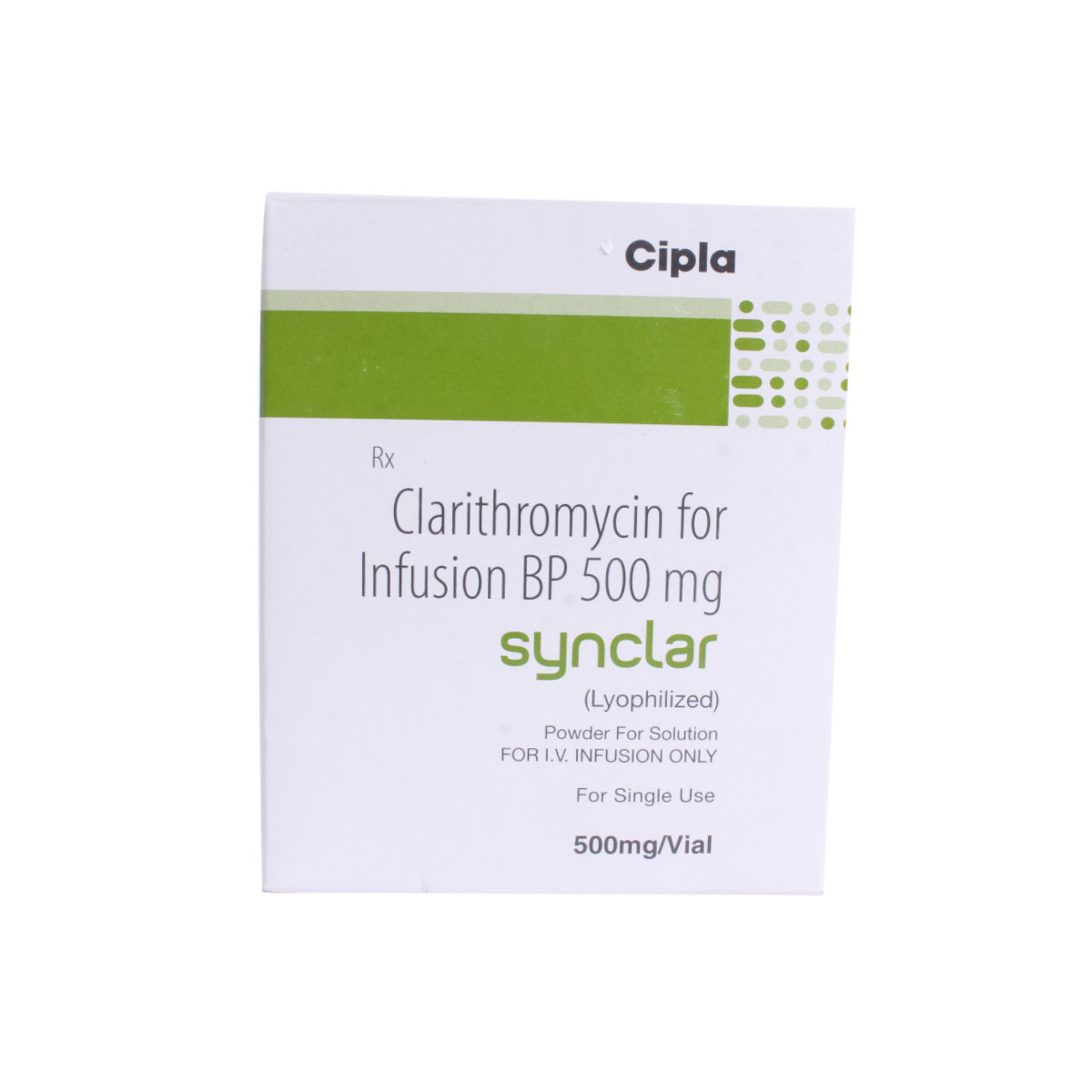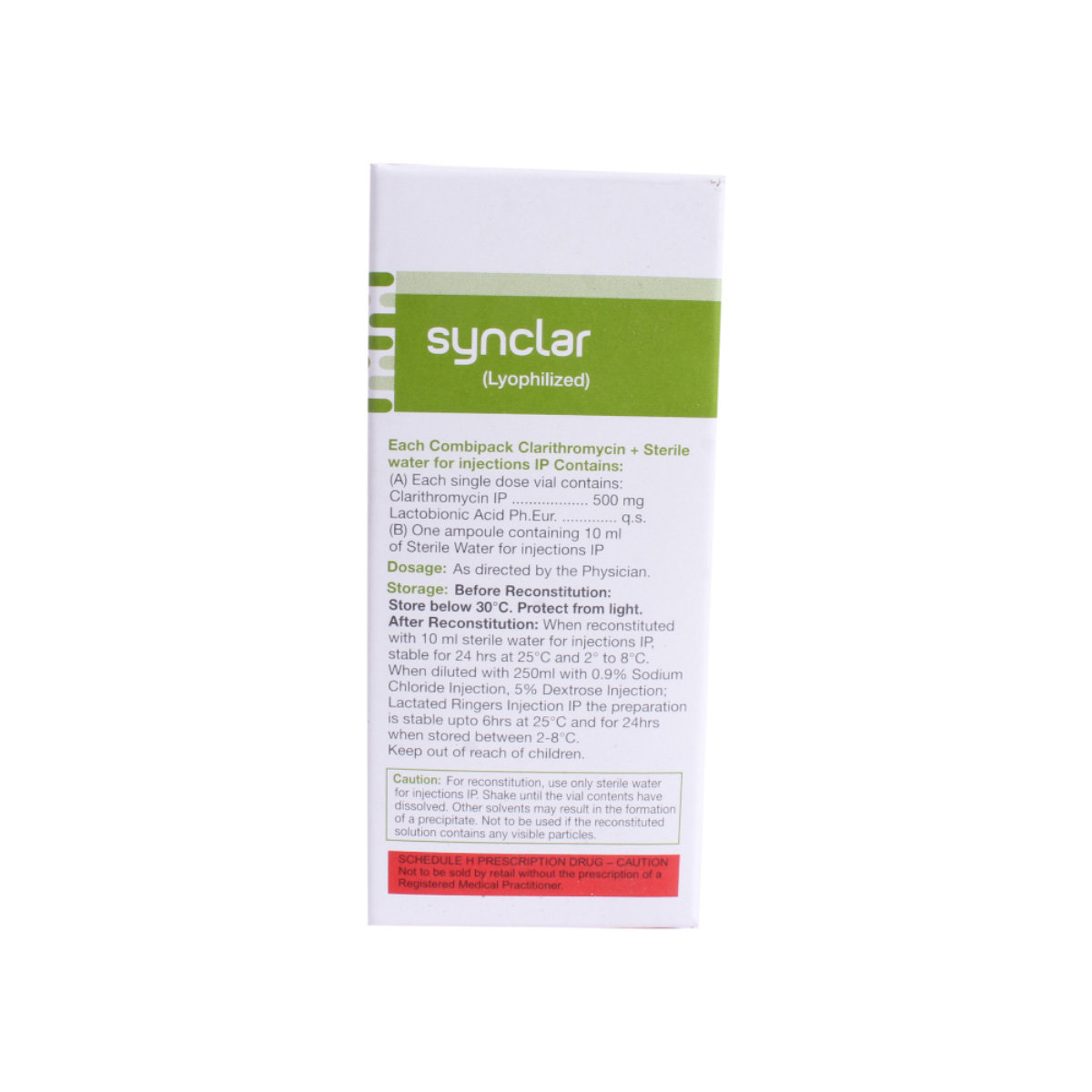Synclar 500mg Infusion
MRP ₹1361
(Inclusive of all Taxes)
₹204.2 Cashback (15%)
Provide Delivery Location
Online payment accepted
 Prescription drug
Prescription drugWhats That
Composition :
Manufacturer/Marketer :
Consume Type :
Expires on or after :
Return Policy :
About Synclar 500mg Infusion
Synclar 500mg Infusion belongs to the group of medicines known as macrolide antibiotics used to treat infections caused by bacteria such as bronchitis, pneumonia, throat, sinus, skin and soft tissue infections. It is prescribed for treating severe infections or when oral therapy is ineffective. A bacterial infection is a condition in which bacteria grow in the body and cause infection. It can target any body part and multiply very quickly.
Synclar 500mg Infusion contains 'Clarithromycin', which works by killing the bacteria that cause the infection by preventing the synthesis of essential proteins necessary for the survival of the bacteria. Thereby, it effectively treats bacterial infections.
Synclar 500mg Infusion will be administered by a healthcare professional; do not self-administer. You may experience injection site phlebitis (redness, swelling, and pain), headache, nausea (feeling sick) or vomiting (being sick), stomach cramps or tummy pain, and diarrhoea. Most of these side effects of Synclar 500mg Infusion do not require medical attention and gradually resolve over time. Please consult your doctor if these side effects become troublesome.
Inform your doctor if you are pregnant, suspect you are pregnant, plan to have a baby or if you are breastfeeding; your doctor will prescribe Synclar 500mg Infusion only if the benefits outweigh the risk. Let your doctor know if you have/had liver problems; your doctor may need to monitor your liver function. Synclar 500mg Infusion may cause dizziness, confusion, and loss of balance. If you experience these, you should not drive or operate machinery. Let your doctor know about your medical condition and the medications you are taking to avoid any interactions.
Uses of Synclar 500mg Infusion
Directions for Use
Key Benefits
Synclar 500mg Infusion belongs to the group of medicines known as macrolide antibiotics used to treat infections caused by bacteria such as lower respiratory tract infections (acute and chronic bronchitis and pneumonia), upper respiratory tract infections (sinusitis and pharyngitis), and skin & soft tissue infections [folliculitis (inflammation of hair follicles), erysipelas (large raised red patches on the skin), cellulitis (bacterial skin infection)]. Synclar 500mg Infusion works by preventing the production of proteins required by the bacteria for its survival. Thereby killing the bacteria and treating infections. Synclar 500mg Infusion is prescribed for treating severe infections or when oral therapy is ineffective.
Storage
Drug Warnings
Do not take Synclar 500mg Infusion if you are allergic or hypersensitive to clarithromycin, any of the ingredients in Synclar 500mg Infusion, any other macrolide antibiotic, or ketolide (macrolide derivatives). Consult your doctor if you are pregnant or breastfeeding. Inform your doctor if you have/had hypokalemia (abnormally low levels of potassium in the blood), hypomagnesemia (abnormally low levels of magnesium in the blood), severe kidney or liver problems, heart rhythm disorders, heart problems, or are prone to fungal infections (e.g. thrush).
Diet & Lifestyle Advise
- Take probiotics after completing the full course of Synclar 500mg Infusion to restore healthy bacteria in the intestine that may have been killed due to the use of antibiotics. Taking probiotics after antibiotic treatment can reduce the risk of antibiotic-associated diarrhoea. Certain fermented foods like yoghurt, cheese, sauerkraut and kimchi can help restore the intestine's good bacteria.
- Include more fibre-enriched food in your diet, as it can be easily digested by gut bacteria which helps stimulate their growth. Whole grains like whole-grain bread, and brown rice, should be included in the diet.
- Avoid intake of alcoholic beverages with Synclar 500mg Infusion as it can make you dehydrated and affect your sleep. This can make it harder for your body to aid Synclar 500mg Infusion in fighting off infections.
Side Effects of Synclar 500mg Infusion
- Inflammation, pain or tenderness at the site of injection
- Nausea
- Vomiting
- Increased sweating
- Stomach pain
- Diarrhoea
- Headache
Habit Forming
Therapeutic Class
All Substitutes & Brand Comparisons
RX
Out of StockClariglan 500Mg Infusion
Gland Pharma Ltd
₹976.8
(₹879.12 per unit)
28% CHEAPERRX
Out of StockClarispey 500 Infusion
₹990
(₹891.0/ 1ml)
27% CHEAPERRX
Out of StockClarific Infusion
Gufic Bioscience Ltd
₹1040
(₹936.0/ 1ml)
23% CHEAPER
Author Details
We provide you with authentic, trustworthy and relevant information
FAQs
Drug-Drug Interactions Checker List
- ERGOTAMINE
- DIHYDROERGOTAMINE
- TERFENADINE
- ASTEMIZOLE
- CISAPRIDE
- DOMPERIDONE
- PIMOZIDE
- LOVASTATIN
- SIMVASTATIN
- LOMITAPIDE
- ATORVASTATIN
- MIDAZOLAM
- COLCHICINE
- TICAGRELOR
- RANOLAZINE
- ALPRAZOLAM
- BUDESONIDE/FORMOTEROL
Special Advise
- Synclar 500mg Infusion might affect blood and liver tests. Inform the person doing the tests that you are taking Synclar 500mg Infusion.
Disease/Condition Glossary
Bacterial infection: A bacterial infection is a condition in which harmful bacteria enter, multiply, and infect the body. It can target any body part and multiply very quickly. When you get infected with bacteria, you can experience generalized symptoms like fever, chills, and fatigue. Anyone can become infected with a bacterial infection. But, people with a weak immune system or taking immunosuppressive medicines are more prone to bacterial infection.

Have a query?
Alcohol
Safe if prescribed
It is advisable to avoid or limit alcohol intake.
Pregnancy
Consult your doctor
Please consult your doctor if you are pregnant or planning for pregnancy.
Breast Feeding
Consult your doctor
It is not known if Synclar 500mg Infusion passes into breastmilk. Please consult your doctor.
Driving
Safe if prescribed
Synclar 500mg Infusion may cause dizziness, confusion, and loss of balance. Therefore avoid driving or operating machinery if you experience any of these symptoms.
Liver
Consult your doctor
Caution is advised. If you have/had liver problems, your doctor may need to monitor your liver function or discontinue treatment.
Kidney
Consult your doctor
Consult your doctor if you have kidney problems, as your doctor may need to adjust the dose.
Children
Safe if prescribed
Synclar 500mg Infusion is not recommended for children as safety and effectiveness have not been established.













